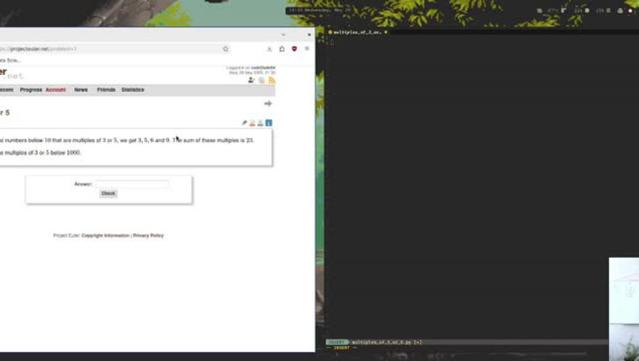I upload other video today
https://video.hardlimit.com/w/86T4wkWgMqmGY4YB5PcoBU
now introduce myself with #projectEuler platform, basically I resolved a simple problem just for know the platform.

I upload other video today
https://video.hardlimit.com/w/86T4wkWgMqmGY4YB5PcoBU
now introduce myself with #projectEuler platform, basically I resolved a simple problem just for know the platform.

I'm really liking #GoLang... done #ProjectEuler problem 24, got the answer on first attempt and it ran in less than 2 seconds which is not too shabby!
Initialised perms as [0 1 2 3 4 5 6 7 8 9]
Permuted to 3628800 items
Collapsed to 3628800 ints
Sorted
The millionth lexicographic permutation of the digits 0, 1, 2, 3, 4, 5, 6, 7, 8 and 9 is: <redacted>
real 0m1.370s
user 0m1.561s
sys 0m0.404s
A little bit of playing around in #Go with some of the #ProjectEuler problems I'd not done before... and I quite like it. Certainly seems easier to get my head around than #rust
Note: I'm not looking to start a Go vs Rust debate... just that I've played a little with both and have found Go easier to work with for the things I've tried.
Project Euler seems to be easy this week. A simple probability calculation for a deck of cards.
If you want the site's award for getting the latest puzzle, it can be done now. There's also another relatively easy one in the latest ten problems.
🧑💻 Write a script to “Find the sum of all the multiples of 3 or 5 below 1000” in O(1), i.e. constant time.
The solution is simple and elegant, try it out.
This problem is from #ProjectEuler.
#coding #math #python #haskell
A few years ago, I had solved a lot of Project Euler problems #ProjectEuler problems in #Python. I even had a lot of very useful utility functions to make things more modular and easier.
After seriously starting to learn #Haskell sometime last year, I've been slowly translating that old code. I translated the utility functions as a way to learn the new language. I made a lot of progress this week on the problems themselves and I've realized how much better it is in Haskell.
Of course, a part of it is that I've changed as a programmer, but the old Python code looks ugly compared to what I'm now writing in Haskell. The functional paradigm with lazy evaluation seems to fit perfectly with the kind of problems on Project Euler.
My only "complaint" is that memoization is harder in Haskell. However, that's because I haven't spent any time figuring out how to do that well. It is not a language issue, but a me issue.
I've definitely decided that I'll be finishing my "solve substantial problems on Project Euler" goal in Haskell and not use Python for that anymore.
I just did 2*3*4*5*6**7*8*9*10 to see the result like a moron
I am sutdying #projectEuler on rust, *please* do not send spoilers or suggestions
I dare you to solve just one #ProjectEuler today:
https://projecteuler.net/problem=836
(difficulty: 0-5% - for real, I swear)